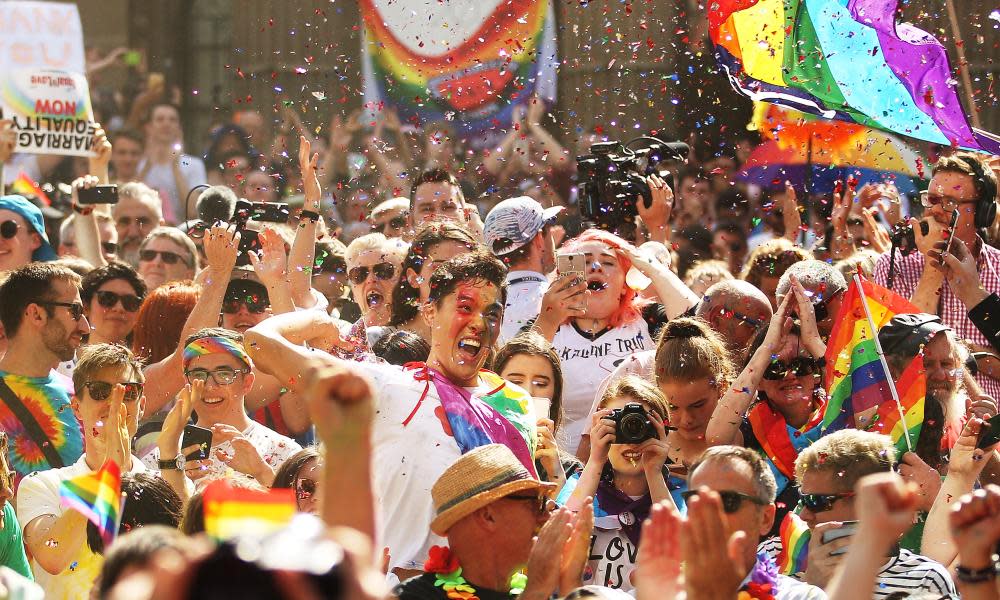Marriage is about power, property and control – it’s time to rethink it | Arwa Mahdawi

It’s been a busy few weeks for ticking things off the Gay Agenda. First, Starbucks launched an ad campaign with lesbians in it and then, in almost as momentous news, Australia said yes to same-sex marriage. Almost 80% of Australians voted in the historic national postal survey, with 61.6% of people in favour of treating gay people like everyone else, and 38.4% against. Unlike a result of, say, 52% versus 48%, that’s a pretty unambiguous indicator of what Australia wants and what it values. As prime minister Malcolm Turnbull said, the country “voted yes for fairness, yes for commitment, yes for love”.
Now, don’t get me wrong, I think it’s great that Australia voted for marriage equality. Being of a homosexual persuasion, I’m all for gay people having equal rights. They tend to come in very handy. And I’m certainly all for fairness, commitment and love. But I’m just not sure that marriage, as an institution, has anything to do with fairness, commitment or love. Quite the opposite, in fact; marriage has long been about power, property and control. It has traditionally been a way of commoditising women and regulating female sexuality and, in many ways, it still is.
We’ve moved on, of course, from the days of coverture when, as William Blackstone describes in Commentaries on the Laws of England (1765), marriage meant that “the very being or legal existence of the woman is suspended during the marriage, or at least is incorporated and consolidated into that of the husband: under whose wing, protection, and cover, she performs every thing”. We’ve moved on from the days when raping your spouse was totally fine under the law – although it’s worth remembering that it wasn’t until 1991 that marital rape became a crime in England and Wales. Nevertheless, marriage still hasn’t been properly modernised. In the UK, marriage certificates still have only the names of the couple’s fathers, not their mothers, for example, although there have been numerous efforts to change this recently.
The traditions we’ve established around marriage also reinforce outdated gender norms. The diamond engagement rings; the white dresses; the father walking the bride down the aisle; the fact that it’s still considered unusual for a woman to propose. I’m surprised by how many strong, smart, feminist women I know seem to have one foot in the 1950s when it comes to marriage. Not to mention that heterosexual marriage still largely benefits men. Studies show that while tying the knot seems to reduce the chances of men kicking the bucket early, unmarried women don’t experience the same negative health effects as single men.
As for marriage encouraging commitment … Well, I’m sorry to say it, but straight people have diluted the institution of marriage. The great and the good of the heterosexual world all seem to treat marriage like an impulse purchase. The president of the United States, for example, has had three wives. Kim Kardashian, the unofficial president, has had three husbands – her second marriage to Kris Humphries famously lasted only 72 days. Which, to be fair, is longer than Britney Spears’ 55-hour marriage. This, perhaps, is down to the burgeoning wedding-industrial complex and the fact that, in many ways, marriage has become more a celebration of consumption than of commitment.
You don’t have to participate in all that, you might say. It’s perfectly possible to get married without spending a fortune on a diamond ring or having a traditional wedding. It’s perfectly possible to have an equal relationship and stay married for longer than 55 hours. Of course. And, to reiterate, I’m glad that Australia voted yes for marriage equality. It’s a heartening sign of progress. But what I think would be even more heartening is if more of us voted no to marriage and if society normalised a more inherently equal form of partnership; one that isn’t permeated by old-fashioned ideals. I don’t often say this, but the French are an inspiration in that regard. France created a system of civil unions in 1999 – the pacte civil de solidarité or Pacs – as a stepping stone to gay marriage. As it turns out, it was enthusiastically embraced by heterosexual couples who weren’t enamoured with traditional marriages and wanted an alternative way to formalise their relationship.
In the UK, gay couples can have a civil partnership but heterosexuals can’t, despite the fact that many straight couples are eager for a more modern alternative to marriage and have been fighting for a change in the law. Earlier this year, Charles Keidan and Rebecca Steinfeld, a couple from London, lost their court of appeal battle to be able to choose a civil partnership over a marriage. I don’t normally feel sorry for straight people claiming “heterosexual discrimination”, but in this case, they’re absolutely right to be angry. Extending civil partnerships to everyone in the UK is vital if we want to call ourselves an equal, progressive society.
So, now that Australia has put gay marriage equality to the vote, perhaps it’s time for the UK to put straight partnership equality to the vote. After all, who doesn’t love a referendum?

 Yahoo News
Yahoo News 
